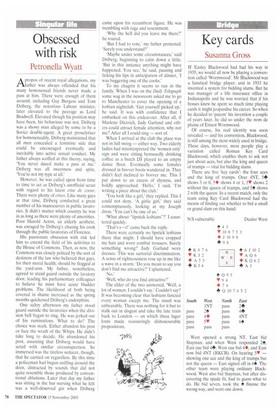Obsessed with risk
Petronella Wyatt
Aropos of recent royal allegations, my ather was always offended that his many homosexual friends never made a pass at him. There were enough of them around, including Guy Burgess and Tom Driberg, the notorious Labour minister, later elevated to the peerage as Lord Bradwell. Elevated though his position may have been, his behaviour was not. Driberg was a showy man alleged by some to be a Soviet double-agent. A great proselytiser for homosexuality, Driberg maintained that all men concealed a feminine side that could be encouraged eventually and inevitably into active sexual conduct. My father always scoffed at this theory, saying, 'You never dared make a pass at me.' Driberg was all sweetness and spite. 'You're not my type at all.'
However, he was called upon from time to time to act as Driberg's unofficial scout with regard to his latest crise de coeur. There were plenty of crises. Like many gays at that time, Driberg conducted a great number of his manoeuvres in public lavatories. It didn't matter which country he was in as long as there were plenty of amenities. Poor Harold Acton, an elderly aesthete, was enraged by Driberg's chasing his cook through the public lavatories of Florence.
His passionate obsession with risk led him to extend the field of his activities to the House of Commons. Then, as now, the Commons was closely policed by the sort of denizens of the law who believed that gays, for their moral health, should be flogged at the yard-arm. My father, nonetheless, agreed to stand guard outside the lavatory door, leading his parliamentary colleagues to believe he must have acute bladder problems. The likelihood of both being covered in shame increased as the spring months quickened Driberg's endorphins.
One sultry afternoon my father stood guard outside the lavatories when the division bell began to ring. He was jerked out of his ruminations. What to do? The choice was stark. Either abandon his post or face the wrath of the Whips. He didn't take long to decide. He abandoned his post, assuming that Driberg would have acted with similar circumspection. So immersed was the tireless seducer, though, that he carried on regardless. By this time a policeman had begun sniffing around the door, distracted by sounds that did not quite resemble those produced by conventional ablutions. Later that day my father was sitting in the bar nursing what he felt was a well-deserved gin when Driberg came upon his recumbent figure. He was trembling with rage and resentment.
'Why the hell did you leave me there?' he roared.
'But I had to vote,' my father protested. 'Surely you understand?'
'Maybe under some circumstances,' said Driberg, beginning to calm down a little. 'But in this instance anything might have happened. You see,' he said, pausing and licking his lips in anticipation of dinner, 'I was buggering one of the cooks.'
To my chagrin it seems to run in the family. When I was on the Daily Telegraph some wag in the newsroom asked me to go to Manchester to cover the opening of a lesbian nightclub. 'Get yourself picked up,' he said. It was with confidence that I embarked on this endeavour. After all, if Marlene Dietrich, Judy Garland and others could attract female attention, why not me? After all I could sing — sort of.
When I arrived at the club the place was not in full swing — either way. Two elderly ladies had misinterpreted the 'women only' sign and were sitting bemusedly drinking coffee as a butch DJ played to an empty dance floor. Eventually some females dressed in bower boots wandered in. They didn't feel inclined to bower me. This I put down to an excess of shyness, and boldly approached. 'Hello,' I said, 'I'm writing a piece about the club.'
'You look like a girl,' they replied. This I could not deny. 'A girlie girl,' they said contemptuously, looking at my Joseph dress. 'You can't be one of us.'
'What about "lipstick lesbians"?' I countered quickly.
'That's s—t!' came back the reply.
There were certainly no lipstick lesbians there that might. I should have cropped my hair and worn combat trousers. Surely something wrong? Judy Garland wore dresses. This was sartorial discrimination. A sense of righteousness rose up in me like a wave in a storm. 'Do you mean to say you don't find me attractive?' I spluttered.
'No.'
'Well, who do you find attractive?'
The elder of the two answered, 'Well, a lot of women. I couldn't say.' Couldn't say? It was becoming clear that lesbians fancied every woman except me. The insult was unbearable. There was nothing for it but to stalk out in disgust and take the late train back to London — on which three lager louts made reassuringly dishonourable propositions.


























































































 Previous page
Previous page